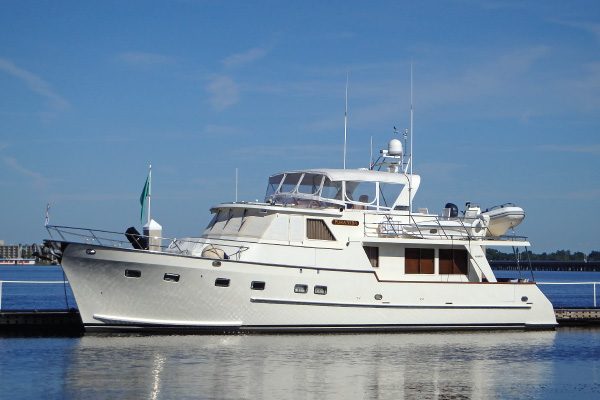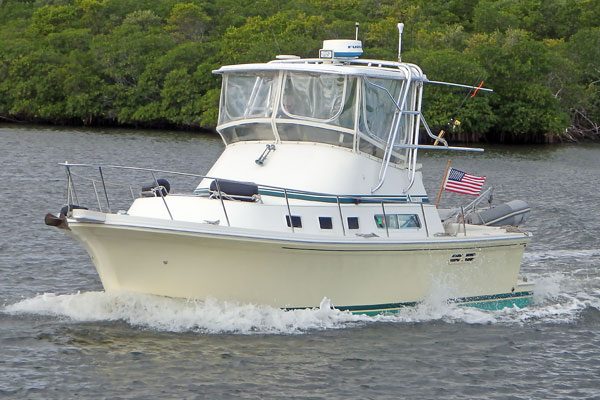At a certain point in your research you will feel pretty comfortable that you have a feel for the types of trawlers available and will also start to better understand pricing. The trawler boating business is closely analogous to the home real estate market (you can think of a trawler as a mobile waterfront home!). Just like property developers parcel tracts of land to build new homes, boat builders create molds and tooling to build new trawlers.
No one expects you to understand the yacht brokerage business, you will figure it out over time, but there are a few things you should realize that can have a large impact on your decisions. The closest analogy to a similar industry would be real estate. Most future trawler owners are home owners and have gone through the purchase of one or more houses. The buying and selling process is very similar. The sales people earn commissions as a percentage of the sale price when the transaction closes.
You can drive around in your car to look at houses based on neighborhoods. You might find ads in the newspaper with a house that has potential or you can scour the internet. Since you are most likely going to use a real estate agent to help with the deal you will probably find yourself connected with an agent to help with the hunt.
In the boating business most trawlers are listed for sale by a brokerage “house” with an agent identified as managing the specific boat listed for sale. Most buyers find trawlers for sale in magazine ads, on the internet or at boat shows. What buyers do not realize is that when you reach out to connect with a yacht sales person you have just established a relationship with that person and you have become “their property” in the form of a sales lead. Every yacht sales person who fields a call or replies to an email about one of their listings makes an assumption that the potential buyer is a “free agent” and not attached to another broker so is “fair game”.

New vs. Used
The choice of new vs. used is one that you should keep an open mind too.
If you have the time, patience and budget – buying a new trawler is the best way to get exactly what you want. You can get the current thinking on best features and equipment, state of the art electronics and entertainment, select the optimum layout, pick the best tender and enjoy the freshness of new… but you do pay a premium for this privilege.
New Trawlers
New boats require a deposit at contract signing, and construction payments during the build process. It is exciting to visit the yard and see your boat come to life. Some of us only buy new things and boat builders are eternally grateful to those individuals who share that preference for the “latest and greatest”. Most trawler brands continue to evolve and improve with every new boat they deliver, incorporating the lessons learned and regularly upgrading to make each new hull a little bit better than those built previously. It is very reassuring to work closely with the builder to create your optimum trawler.
Some boat builders have a dealer sales network who stock new boats in inventory. If you buy a new boat off the show room floor you can usually negotiate a discount and have minimum waiting time.
Two major cost decisions that new trawler buyers enjoy selecting are their navigation/communications electronics and tender. Additional costs to set up a new trawler include bedding, towels, carpeting, interior décor, galley ware, privacy blinds, canvas goods, tools, spare parts, and…there are lots of personal purchases to complete the outfitting.
I advise my clients to study the used trawler market (even if they are only interested in a new build) so that they can better understand the layout and equipment choices and make decisions based on which selections work best and make the most sense. This also helps them budget those extra items mentioned above.
All new boats eventually come on the market as used or “brokerage” boats. A brokerage trawler will always provide your best value, but the market selection when you are ready to purchase may not provide the model and features you desire.
Once you know which trawler you are targeting, your decision narrows down to price and location. The important exercise is to determine what it is really going to cost you to buy the right trawler. Unfortunately it is not that simple, there is the purchase price, the “fix-it-up” price, surveyor fees, bank loans, taxes, insurance and slip rent, etc. – here is where your broker can help you work through your budget and help provide contacts and resources.
Used Trawlers
All trawler owners will someday decide to sell their boat. They have a couple of choices, they can sell it on their own or they can hire a broker to market the boat for them. All of the boats you see on the MLS (multiple listing services) are for sale through brokers and the seller has signed a listing agreement authorizing the broker to actively represent the seller in an effort to find a buyer.
Yacht brokers, like real estate agents, aren’t paid a salary, have no medical benefits, most likely do not have profit sharing or a pension plan and instead survive on one source of income, a commission. Commissioned sales are only paid upon the successful completion (closing) of a sale and typically the Broker (house) splits the commission with the agent (sales person). In simplest terms a listing agreement is a written contract that a seller signs which sets an asking price, an agreed commission, outlines the arrangements for showing the boat and authorizes the broker to advertise, promote and solicit offers.
A trawler listed for sale by a brokerage firm will typically have an agents name attached to that boat as the “face of the boat” through which all inquiries are coordinated. This is the person who worked out the details with the seller to sign a listing agreement authorizing that brokerage house to market this particular trawler for sale. There are essentially two types of listings, a Central/Exclusive where only one house can advertise the trawler, or an Open listing where the seller can select as many brokerage firms as they wish to market their trawler. (In my opinion, open listings can confuse the market place, particularly if the same boat is offered for sale at different prices) keep this in mind if you have narrowed down your search and make sure you aren’t comparing the same boat just offered for sale by multiple outfits.
As a buyer doing your homework you will come across a trawler that is very intriguing, one that you would like to know more information about. Maybe the listing is detailed and inspires you to call to find out more and maybe even arrange to get aboard. Maybe the listing write up is a bit vague and you have questions about what appear to be obvious missing details that you would like clarified. You’ve reached a critical step in the process and what you do next can dramatically affect how things play out.

Remember, the Seller hired the broker to sell their trawler. When you contact this same broker you are a new and secondary relationship. Now, most brokers have high ethical standards and a fiduciary responsibility to buyers and sellers, but more and more buyers are coming to realize that in making a sophisticated trawler purchase they are truly best represented by selecting their own “buyers broker” or “trawler advocate” someone whom they selected based on reputation and product knowledge to be on their side and conduct the negotiations for them.
In all brokerage transactions the seller has agreed to include a commission. This is part of the listing agreement – what price to ask for and how much the seller will pay in commission if that price is achieved. The seller is really looking at a net number – what they would like to have in their pocket when the transaction is closed. But they have to add the commission and some “wiggle room” on top of that to develop their asking price. The seller usually isn’t too concerned with how the commission is divided up, but the listing broker would much prefer to represent both sides of a deal and in order to keep better control of the transaction and realize a higher commission. If a broker tells you “don’t worry, the seller is paying the commission” be aware that this isn’t really true. They buyer is really the person who is paying the commission as a part of the total purchase price.
It is not at all uncommon for a listing broker in a trawler transaction to work in a “dual-agency” role representing buyer and seller – it is important for this fact to be disclosed in any offer and signed off as agreed to by both buyer and seller.
Before you contact the listing broker to ask about a particular trawler you should understand what your choices are by reading more about brokers.

